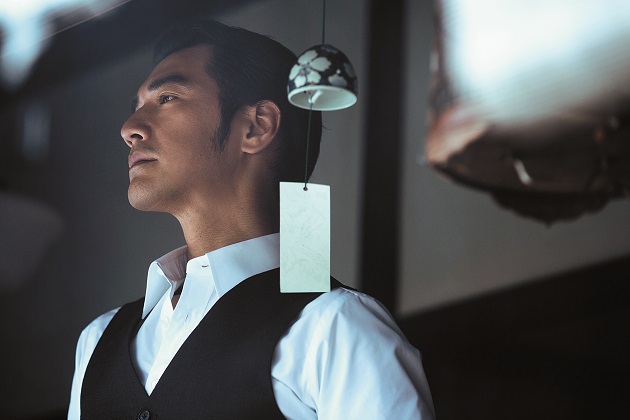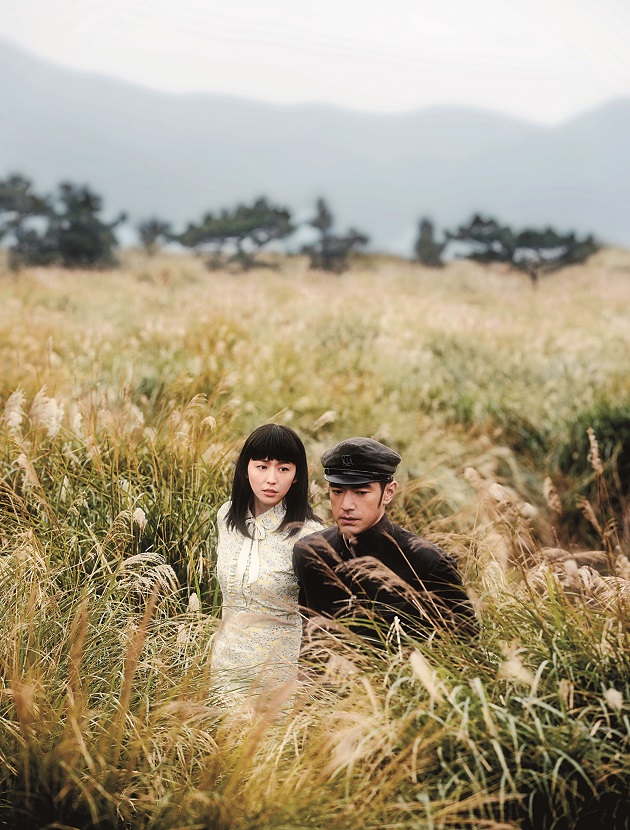Takeshi Kaneshiro:
I Am not a 'Dream Guy'

Source:CW
CommonWealth Magazine talked to Takeshi Kaneshiro when he returned to his native Taiwan recently to promote his latest film. Out of the limelight, Kaneshiro is very different from his melancholic heartthrob on-screen persona.
Views
I Am not a 'Dream Guy'
By Yueh-lin MaFrom CommonWealth Magazine (vol. 562 )
By Up on the stage, Takeshi Kaneshiro always holds himself straight. Whether it's an appearance at a movie premiere or a press conference, he never loses his elegant poise no matter how blinding the flurry of camera flashes or how deafening the screaming of his fans.
Back in his hotel room on the 20th floor of the Shangri-La Far Eastern Plaza Hotel Taipei and no longer in the spotlight, however, the movie star loosens up and shows his comical side.
"Wow, I'm old enough to be interviewed by CommonWealth Magazine. Thank you, thank you!" Kaneshiro blurts out as he takes the reporter's name card. His entourage of manager and movie PR people bursts into thundering laughter.
He has perfect skin and his eyes are as bright as in the many commercials in which he has appeared.
Quite contrary to his reserved demeanor in public, Kaneshiro is lively and talkative, underlining his words with wild gestures and vivid facial expressions. One moment he deeply furrows his eyebrows, the next he suddenly explodes with laughter again.
When the conversation touches on Chungking Express, the 1994 Hong Kong drama film directed by Wong Kar-wai that gave Kaneshiro an international following, the actor grabs a bottle of mineral water from the table and demonstrates 20 ways to drinking water.
Apparently, Taiwanese director Kevin Chu, who shot the comedy China Dragon with Kaneshiro in a leading role, was right when he said that the actor has comical talent.
What goes through Kaneshiro's mind? How does he view personal growth and setbacks? Why does he feel that he has not been a success at all?
The following are excerpts from the interview:
Q: Let's first talk about movies and then about life, okay?
A: Let's talk about movies then, not just in the beginning.
Q: What was the biggest challenge during the filming of The Crossing?
A: Actually, the shooting of every movie is a challenge. As far as I am concerned, [the greatest challenge] lies in whether I will be able to portray that character. This time in The Crossing, I had less of a burden with regard to language; I had no problems there because I speak all of them, Mandarin, Taiwanese and Japanese.
Language is quite an important part of acting. [South Korean actress] Song Hye-kyo, for instance, made a great effort speaking Chinese in the drama; she took great pains to get the shape of the mouth and the pronunciation right. I admire her a lot.
In The Crossing, I was able to concentrate on challenging the emotional part. Therefore, I would worry a lot whether I would be able to interpret the role of [Taiwanese physician Dr. Yan] Zekun well, to bring to life a plot involving separated lovers bound by the times and caught between two cultures who face heavy pressure from their families.
Q: You are said to cry real tears in crying scenes. Is this true?
A: Yes, because I cannot act, I can only rely on my experience. I have not taken acting classes, so my situation is different.
I have been very lucky; I had an opportunity to participate in film production when I was young. I met many big directors and other actors, but I could still only observe how others acted and then figure out how I could achieve the same effect with my own method.
In this drama, my greatest fear was that I might be crying too much, because this story makes you cry so easily.
Drawing on Experiences to Act
Q: When you played the detective Xu Baijiu in director Peter Chan's 2011 martial arts film China Dragon, you decided to speak Sichuanese. Do you like to challenge yourself in the process of filming a movie?
A: Back then, I kept telling director Chan that I couldn't find anything that makes Xu Baijiu special. I feel there must be a meaning behind the existence of a person, but existence will only be meaningful if there are defining characteristics.
When we had filmed one or two days in Yunnan, I found myself deeply impressed with a staffer who spoke the Sichuan dialect. So I told the director that maybe we should make Xu Baijiu speak Sichuanese. The director said, "You asked for it," because he knew that I couldn't speak Sichuanese at all.
Q: You have been acting for many years now. Which stage of your career made you grow the most personally?
A: Growth is still related to the passage of time, be it your age or the way of thinking, nothing will remain the same. As time passes, you will encounter more things. People my age will experience that older relatives such as an uncle or an aunt pass away. You must have lived life; you must have truly gone through it to be able to feel what it is about.
 Takeshi Kaneshiro says he was able to fully focus his attention on portraying the romantic relationship at the heart of Crossing Part 1 because he didn't have to worry about learning the languages used in the film.
Takeshi Kaneshiro says he was able to fully focus his attention on portraying the romantic relationship at the heart of Crossing Part 1 because he didn't have to worry about learning the languages used in the film.
Nevertheless, in terms of thinking about movies, I developed a great interest in that through Wong Kar-wai. Participating in his movies made me think, "How can this be so much fun!" Isn't there a script? (Editor's note: Wong rarely uses a finished script when making his movies.) Yes, there is. You will get one page per day, and he'll say, "We'll shoot the same scene again tomorrow. We won't use what we shot yesterday."
I was young then. If you told me to do this today I would probably ask you impatiently "What? Reshooting again? Can't you just write down your script first?"
Still, when you come across such a director, he will also give you many opportunities. You can do the same movements, you can probably repeat it 20 times, or perform it for him in 20 different ways.
Back then, I thought that movies, creative work is very interesting because it turns flat text into something three dimensional. In those days my attitude was: I want to try out directors and plots of different styles. With Kevin Chu, for instance, I also shot an action comedy.
Q: You mentioned that growth depends on the passage of time, but many people grow after suffering a setback. Have you ever experienced a major setback?
A: Of course, I have had setbacks, but I can't really come up with anything concrete. Probably when I wasn't satisfied with how a movie turned out; or when a misunderstanding spun out of control into a very big misunderstanding, and people got a certain wrong impression of you.
For example, when people say "you are a dream guy" – I think this is a misunderstanding. I don't have any particular feelings about this; it's only that I don't feel I deserve it.
Everyone asks "Why are you so mysterious?" I say, isn't it that you guys want to know too much? You are too curious; it's not that I am too mysterious. Of course, I have more of a low-key personality. However, this is only the case because others keep such a high profile; it's not that I am too low profile, ha-ha, it's all relative.
I Have Failed, but No One Remembers
While growing, you will definitely have some setbacks. You need to fail before you can have success. Then your success will be more solid. I have had my failures; it's just that people do not remember them well. Consequently, I have not been successful either. Actually, life is not about succeeding or not succeeding, success is only a process. Aren't we all going up and down all the time?
Q: You mentioned that every person must have a distinct character. What is yours?
A: What is my distinct character, what is it? Eh...Actually, I don't have an answer. What is my personal trait? Being very lazy? (laughs loudly)
Of course, I am in favor of letting nature, destiny run its course. I feel that you can encounter many things but not by looking for them. Think about it. If we picked the best director, the best script and the best actors, would the resulting movie be definitely the best?
There are many things that you cannot force; you can only rely on fate. So when you find something, you need to treasure it, and when you have not found it, you must not think "Oh, my! I haven't found it" because you will still be learning something. Just try to appreciate things, appreciate every single second.
What is my personal trait? I really want to give you an answer. Yet I feel I am still growing. Whatever I say, people will [use it to] define me. However, I feel some parts of me have changed and some haven't. When I truly don't have an answer, I should probably not force myself to say something because it could create misunderstandings.
Q: It seems you are leading a rather simple life, staying true to yourself, aren't you?
A: Now that you say it, it seems to be that way.
Q: Contemporary society emphasizes ambition, but I have the impression you tend to go with the flow. Do you sometimes get the feeling that you do not fit in with this society?
A: It's different, I don't think this society is as you described it. For example Taiwan, you can't say Taiwan is like that, because every region is different and has its own culture.
I may not fit in with a certain region but in another region, I may feel very comfortable.
It's not that I'm deliberately trying to stay true to myself or whatever – it's just that when you haven't experienced or participated in or tried certain things, those things are less likely to influence you or turn into an obsession.
Translated from the Chinese by Susanne Ganz






